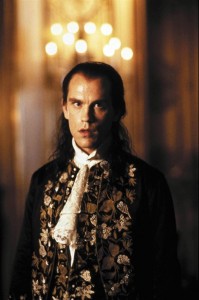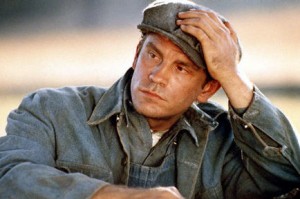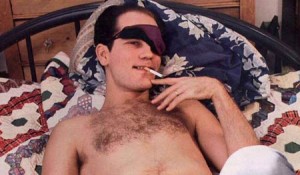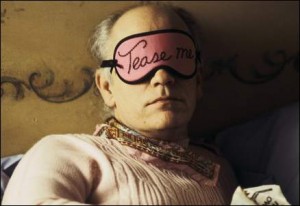“Either you sit in the box people make for you or you get out there and do what you want because I could be gone tomorrow. I want to investigate the things that interest me first. I don’t think that’s at all peculiar, I’m just not afraid to fail.” – John Malkovich 2011
Last Saturday Front Row Reviews attended the Barbican’s John Malkovich screentalk accompanied by a special showing off his 1988 masterpiece Dangerous Liaisons, in which he plays alluring aristocrat the Viscomte de Valmont. Licentious, seductive, exquisite and majestic this beguiling take on the politics of power in the sexually charged France of the 18th century is a joy to consume. A sensuous feast that will excite and entice in equal measure; and a film worth revisiting as many times as the Viscomte de Valmont revisits his writing desks. It was a pleasure to see it in the grand arena that is the Barbican screen, a positively amphitheatre-esque structure that suited the period play look and feel of the film perfectly.
After the audience had a moment to compose themselves after such provocative viewing the man himself entered and what an awe inspiring sight to behold. Normally I don’t get caught up in the aura of actors – finding myself more interested in their characters than them themselves, and as such always feel in equal parts disappointment and nostalgia – Malkovich struck wonder in me as only such a prestigious veteran could. I imagine I would feel likewise upon seeing any of his three co-stars from Red.
Assuming, quite rightly, center stage he began by reminiscing on the role most present. He stumbled into it through a friend he was having lunch with (as all great Hollywood parts seem to come about) and never knew about or auditioned for it before he landed it there and then. To be John Malkovich! Maybe it’s the intellectual dynamism or orgasmic drawl that he possesses that made him feel so right at the time; an intellectualism, which he insists, is misplaced. He feels critics have imposed on him a facade, the intellectual, the slow-burn performer, the calculating, almost Machiavellian sentiment behind his eyes but he insists it’s a wrongful appropriation of his character and from his words and his relaxed posture and openness to self-analyse it would seem these qualities are unfounded, myths maybe that make a mythic figure but as often seems the case unfounded. Ironically asked which of his characters he most identifies with it was Lennie Small from Of Mice and Men.
He commented on his resentment of modern day screenwriting that curtailed his ability to play characters as iconic as the Viscomte. This deficiency he thought however was both deplorable and necessary, as sometimes “you just have to make something people want to see”. A wry sense of humour and knowing sarcasm of the industry and its viewers pervaded his speech. But he himself said he enjoyed the range of movies out there, however poorly written or presented; diversity for him was very much a positive part of the industry and its productions. Indeed he wants to be open to anything that comes his way, evaluating everything on its own merits and perhaps giving it a chance, a luxury maybe only afforded to such a tested and grandiose actor.
And when he does take a role he really takes it literally – he urged that he wasn’t only playing a French aristocrat, to truly act, he had to become a French aristocrat! Acting it seems for him was not an outward physical expression of a role but very much an embodiment of that thing within oneself. He resented the impressionistic style of acting that dominates the industry, for him it seemed better to make up the actions of an autistic part, feel it, embrace it and try to become that rather than merely observing and reproducing it in a vacuum. For example in Dangerous Liaisons he was presented with the possibility of performing 2000 separate types of bow within the movie to adhere to historical accuracy. Malkovich’s response was to create his own as he felt from his immersion in the role and the character – his answer to the historical adviser – “well now you have 2001”. And while this grates with my own background in History it’s inspiring to see an actor who really feels the role he plays, allowing it to extend to his extremities and recreating that person before our eyes; surely this is the pinnacle of acting, the cusp from where an actor leaps to become an artist.
Indeed, acting isn’t the only time he’s made a leap into brave areas. In politics and policy he’s a committed advocate of the death penalty for murderers, something that astonished with thespians usually liberal, reconciliatory attitudes. His opinion rested not on an archaic line of argumentation of Biblical allusion but on the pragmatic thought that by allowing murderers mercy we effectively implant in them the honour of their being “the final arbiters of life and death”, and by allowing murderers to be released we advocate the death penalty but we just place the judgement in the hands of those convicted murderers. It is an unusual, almost realpolitik view, and one difficult to defend or apply universally but one that pervades his thinking on the subject.
This wasn’t the only contemporary nerve in politics he rested on during the interview. He spoke out against ideological perspectives that urged or condoned killing. Believing that fundamentally what they imply is that “you can’t convince me so you’ll kill me”. And in this world of individual choice and freedom it appears that more and more the inability to convince someone of a specific world view is leading more and more to that which he spoke against, the killing over the convincing. It’s an elegant point and one that actually attacks the heart of the matter; that those who kill for their cause discredit their cause as within the killing its inherent weakness is exposed.
Moving into lighter territory he was unsure as to which of his characters he’d ever wish to meet, perhaps because of his immersive performances maybe he feels he knows them all well enough already. But after long consideration he settled with Casanova who he mused with a hint of longing admiration had such a “strange, full life”. It’s a role both alike and unlike the Viscomte, each use sex as their means of expression but for wholly different purposes, Casanova to flourish and enjoy and Viscomte to dominate and control. Together they’d surely make a formidable pair.
Ending on a sensitive note he asserted that an Oscar was never a “ghost I chase particularly” and one that he was happy for others to fulfil. Maybe due to the fact that he believed his best work existed in Colour Me Kubrick but the film itself didn’t work and therefore his performance was void. It was a heartening perspective and one that displayed the mutual collaboration of all effects. For Malkovich his acting seems really to be part of something when he performs as opposed to many actors who undeniably use their projects to showcase their own talent.
John Malkovich was a man who held himself formidably well, he was a man who seemed at once both to put you at your ease and inspire in you something unusually profound. It was a pleasure to witness his stream of consciousness, his knowing pauses and his humble acceptance of himself and his place in the world.
The most charming sentiment the man left us with was his understanding of acting, which he assured us, was akin to surfing. A good performance comes when a phenomenon occurs, a break of surf, where there is a “collision between the public and good material”, a collision he seemed to feel was tailing off in cinema, maybe it is for this reason he has turned his attention more recently to the stage. In fidelity to his playful nature, all he really wants to do is ride the wave…








